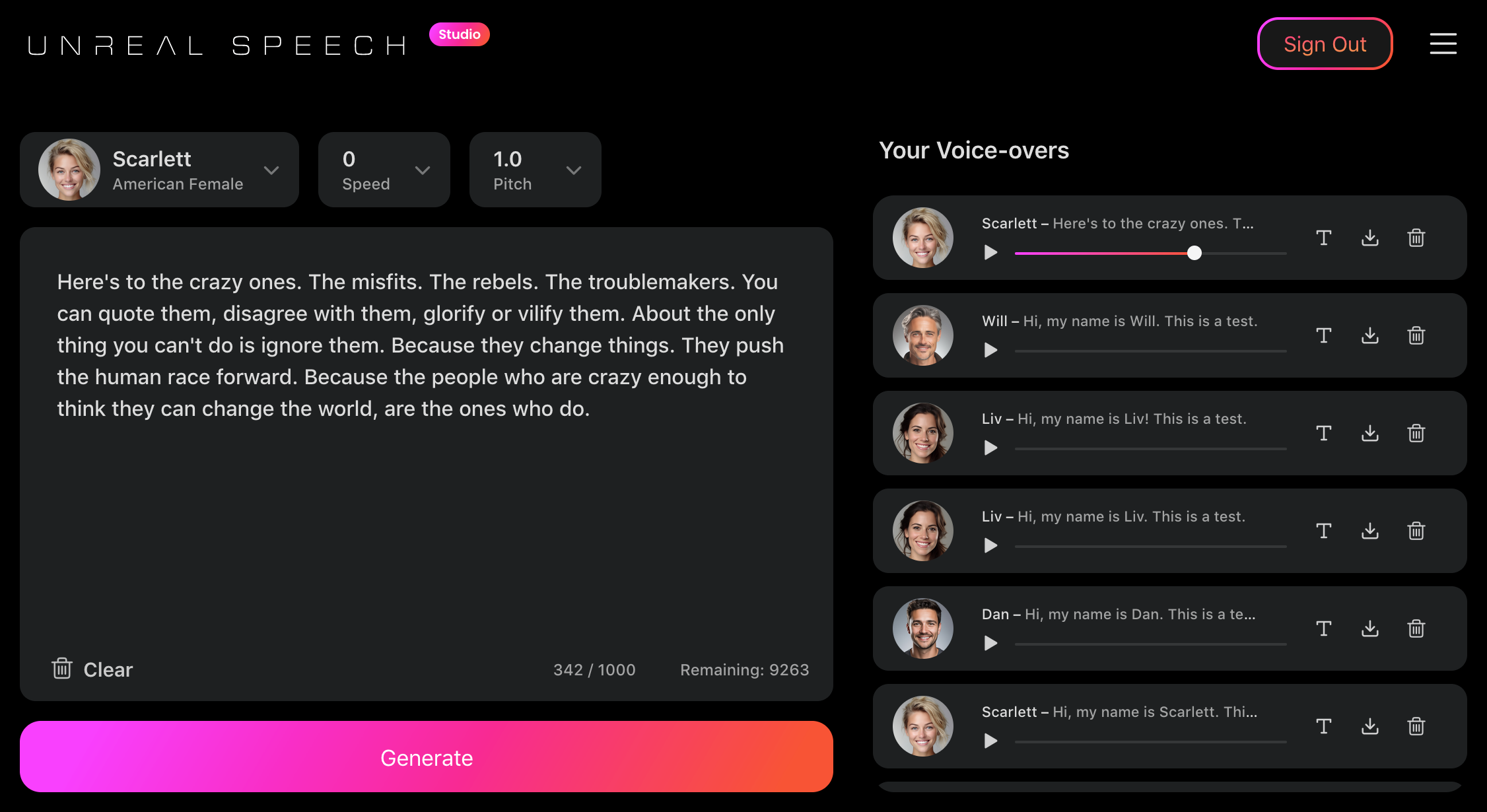Exploring 2023's Premier TTS API: Transforming Audio Synthesis

Advancing Audio: The Rise of 2023's Premier TTS API
The unveiling of 2023's top TTS API by Unreal Speech has marked a significant leap in the domain of text-to-speech technology, offering a novel gateway to transform the written word into a symphony of spoken language. This pioneering advance presents myriad possibilities for American university research scientists and seasoned software engineers, enabling them to design and develop applications with enriched audio interactions. The TTS API stands out not simply as a tool but as a catalyst, revolutionizing the way we perceive and interact with digital content. Through its ability to decode text with near-human precision and melody, it sets a new standard in the technological dialogue between users and their devices.
Leveraging APIs like Unreal Speech's offering, these professionals—armed with expertise in Python, Java, and Javascript—can imbue their digital solutions with responsiveness and accessibility previously untapped. The Unreal Speech API epitomizes the collaborative synthesis of deep learning, machine learning, and human creativity. It exemplifies a digital tool shaped with the foresight of easing the workflow for developers while significantly enriching the auditory experiences of end users. In a landscape teeming with innovation, the TTS API emerges as a beacon for audio development, beckoning a future where technology extends the power of voice to every story and every interaction.
| Topics | Discussions |
|---|---|
| Introducing the TTS API | An introduction to the advanced TTS API capabilities brought forth by Unreal Speech, revolutionizing the landscape of speech synthesis technology. |
| Transforming Speech Synthesis with Unreal Speech | Dive into the transformative features of Unreal Speech's TTS API, expanding the boundaries of text-to-audio conversion for a diverse digital audience. |
| The Future of TTS APIs | A look at the future implications of TTS API development and how it will continue to enhance user engagement and communication efficiency. |
| TTS API Programming Tutorials | Technical guides and code samples to aid developers in seamlessly integrating and exploiting the full potential of TTS APIs in their projects. |
| TTS API in Practice: Industry Applications | Insights into practical applications of the TTS API across different industries, demonstrating its impact on operational effectiveness and user interaction. |
| Common Questions Re: TTS Tech | Answers to common queries regarding the nature and functionalities of TTS technologies, spotlighting how these tools are shaping the tech world. |
Introducing the TTS API
Understanding the Text-to-Speech (TTS) Application Programming Interface (API) begins with familiarizing oneself with the key terms defining this technological evolution. As TTS APIs become more sophisticated and integral to various sectors, it's crucial for professionals, particularly those in the American tech sphere, to grasp these terminologies for effective implementation and innovation. This glossary outlines the essential terms that are pivotal for lab software engineers and research scientists to understand as they navigate through the intricate details of TTS tech development.
TTS (Text-to-Speech): Technology that converts written text into spoken voice output.
API (Application Programming Interface): A set of rules and definitions that allows software programs to communicate with each other, enabling the integration of TTS capabilities into applications.
Deep Learning: A branch of machine learning involving neural networks with multiple layers, capable of learning from large amounts of unstructured data.
Machine Learning: A field of artificial intelligence that enables machines to learn from data and make decisions or predictions based on that learning.
Neural Networks: Computer systems designed to simulate the way humans think and learn, increasingly used in TTS for natural voice generation.
Speech Synthesis: The process by which a computer program converts text into speech that sounds as natural as possible.
Natural Language Processing (NLP): The technology used to aid computers to understand the human language as it is spoken or written.
User Engagement: The measure of a user's interaction and experience with a software platform, often enhanced by including TTS features.
Operational Efficiency: The ability of an organization to deliver products or services in a cost-effective manner while ensuring high quality.
Digital Accessibility: The ease with which people with disabilities can access and use digital resources, which TTS technology seeks to improve.

Transforming Speech Synthesis with Unreal Speech
Published on October 6, 2023, the article "2023's Top TTS API - Transforming Speech Synthesis" by Unreal Speech provides comprehensive insights into the latest TTS API improvements. This meticulously optimized TTS API, possibly also known as a text to audio API, marks a significant advancement in auditory experiences, seamlessly turning written language into lifelike spoken words. Enhancing user engagement and broadening accessibility, Unreal Speech positions its API at the forefront of the industry's push towards more fluid, natural-sounding digital interactions.
The in-depth 21-minute read delineates the TTS API's design, which underpins its robust capacity for delivering high-quality voice synthesis. Its functionalities are not only a testament to its contemporary technological prowess but also to its potential impact on the future of speech synthesis. By harnessing state-of-the-art deep learning techniques, these APIs are able to comprehend and replicate the subtle variances in human cadence and tone, promising an auditory clarity that enhances user interfaces and digital content.
In heralding a new phase of the digital revolution, Unreal Speech's TTS API has become an essential instrument for improving operational efficiency and communication across various sectors. The article suggests that through this tool, industries can address their need for more interactive and accessible content, signifying a vital step toward an ubiquitous presence of TTS technologies in everyday tech applications. While the specific author credentials and affiliations are not detailed in the provided content, the article embodies the collective knowledge and technological sophistication that Unreal Speech offers.
The Future of TTS APIs
The evolution of Text-to-Speech (TTS) APIs, particularly in 2023, has been nothing short of revolutionary. These APIs have transitioned from mere text-reading tools into sophisticated interfaces that provide lifelike auditory experiences. The Unreal Speech TTS API, a leader in the field, demonstrates the potential future trajectory of speech synthesis technology. Driven by advanced algorithms that stem from deep learning and artificial intelligence, this technological leap shows us that the future will be rich with digital voices that not only sound natural but can also express a wide range of emotions and intonations.
Developments in TTS APIs are particularly exciting for their potential applications. As these tools become more user-friendly and nuanced in their capabilities, we can expect to see them adopted in a broader range of fields. From aiding in language learning to supporting assistive devices for those with disabilities, and from powering responsive virtual assistants to providing engaging experiences in gaming, TTS is set to be an integral feature that will shape the user experience of tomorrow's technology.
The future of TTS APIs will likely focus on personalization, where speech synthesis can be tailored to individual user preferences and contexts. Coupling this with the advancements in ML and AI, TTS technology will go beyond simple voice commands, becoming a dynamic two-way interaction system that can understand and respond to the user's needs in a more human-like manner. This integration will breed a new level of convenience and efficiency across user interfaces, making digital interactions more akin to human conversations.
TTS API Programming Tutorials
Implementing the Text to Audio API
Implementing a Text to Audio API like Unreal Speech into a software project entails a few key steps to enable text-to-speech functionality. First, developers typically need to register for an API key from the service provider. Once they have the key, they can make HTTP POST requests to the API endpoint, sending text data and receiving an audio stream in return. While specific code samples for Unreal Speech are not provided, a hypothetical example in Python could look like the following, showcasing a fundamental interaction with a TTS API:
import requests
response = requests.post(
'https://api.v6.unrealspeech.com/synthesisTasks',
headers = {
'Authorization' : 'Bearer YOUR_API_KEY'
},
json = {
'Text': '''<YOUR_TEXT>''', # Up to 500,000 characters
'VoiceId': '<VOICE_ID>', # Scarlett, Dan, Liv, Will, Amy
'Bitrate': '192k', # 320k, 256k, 192k, ...
'Speed': '0', # -1.0 to 1.0
'Pitch': '1', # 0.5 to 1.5
'TimestampType': 'sentence', # word or sentence
#'CallbackUrl': '<URL>', # pinged when ready
}
)
print(response.json())This example illustrates sending a text payload to an API endpoint and saving the resulting speech audio to an MP3 file locally. Error handling ensures that you have feedback if the API request doesn't execute as expected.
Customizing TTS Integration for Varied Applications
Customizing TTS integration can significantly enhance the user experience by tailoring the voice output to specific use cases. TTS APIs like Unreal Speech offer parameters to modify attributes such as speech rate, pitch, and volume. For a web application, JavaScript can be used to interact with the TTS API and dynamically generate speech that aligns with user interactions. Here's a brief example showcasing customization options:
// Short endpoint: /stream
// - Up to 1,000 characters
// - Synchronous, instant response (0.3s+)
// - Streams back raw audio data
const axios = require('axios');
const fs = require('fs');
const headers = {
'Authorization': 'Bearer YOUR_API_KEY',
};
const data = {
'Text': '<YOUR_TEXT>', // Up to 1,000 characters
'VoiceId': '<VOICE_ID>', // Scarlett, Dan, Liv, Will, Amy
'Bitrate': '192k', // 320k, 256k, 192k, ...
'Speed': '0', // -1.0 to 1.0
'Pitch': '1', // 0.5 to 1.5
'Codec': 'libmp3lame', // libmp3lame or pcm_mulaw
};
axios({
method: 'post',
url: 'https://api.v6.unrealspeech.com/stream',
headers: headers,
data: data,
responseType: 'stream'
}).then(function (response) {
response.data.pipe(fs.createWriteStream('audio.mp3'))
});
In this JavaScript example, various parameters are assigned to create a custom speech experience in a web context, adjusting the rate, pitch, and volume to enhance speech output distinctively tailored for the application's requirements.
TTS API in Practice: Industry Applications
Unreal Speech's text-to-speech synthesis API represents significant savings in TTS technology, claiming to slash costs by up to 90%. For academic researchers, this equates to substantially reduced operational expenditures, allowing funds to be allocated towards more profound investigations in fields such as computational linguistics, language learning, and AI. The API's promise of providing up to 625 million characters per month and an estimated 14,000 hours of audio under the Enterprise Plan supports extensive research endeavors requiring substantial audio data.
From a development perspective, software engineers can benefit from the cost-effective and efficient audio solutions Unreal Speech offers. With the claim of being up to 10 times cheaper than competitors like Eleven Labs and Play.ht, and up to 2 times cheaper than tech giants like Amazon, Microsoft, and Google, the Unreal Speech API becomes an attractive option for integrating advanced TTS features into applications. Additionally, the up to 5 billion characters per month afforded by the Enterprise Plan can sustain large-scale projects that require massive amounts of voiced content.
Game developers can leverage this API to enhance player experience, offering a range of voice options from narrative voices to character dialogue. For educators, the API presents an opportunity to diversify teaching methods through audio-visual learning materials, making education more accessible and engaging. A high-quality listening experience can be consistently delivered, thanks to the API's reported 99.9% uptime and low latency, thus ensuring learners remain engaged and educators have reliable tools at their disposal. Moreover, the potential for multilingual support opens the door to global applications, reinforcing Unreal Speech's role in driving forward the TTS industry.
Common Questions Re: TTS Tech
How Do AI Tools Drive Text-to-Speech Quality?
Artificial Intelligence (AI) tools enhance text-to-speech (TTS) quality through advanced learning models, which train on diverse datasets to replicate human-like intonation, rhythm, and pronunciation for more natural speech synthesis.
Which Free AI Voice Generators Excel in Performance?
Free AI voice generators that excel in performance typically offer a host of features, accessible usability, and sufficient voice quality that stands up to their premium counterparts, providing practical voice solutions without a financial barrier.
What Makes an AI Voice Generator Stand Out?
An AI voice generator stands out based on its ability to deliver a rich auditory experience with clear, emotive, and fluent speech synthesis that closely mimics the nuances of natural human communication.